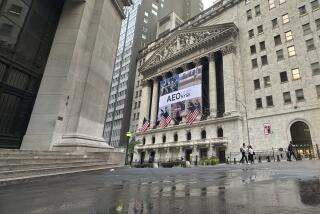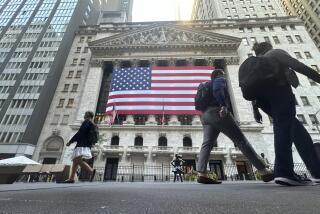Investors Expect Fed Not to Raise Rates
Stocks look set to float upward this week, with the Dow closing in on the psychologically sensitive 10,000 level, as investors expect the Federal Reserve to leave interest rates unchanged at its Tuesday meeting, keeping the economy pumped with cheap money.
Stocks took a knock Friday as the government’s monthly job report showed companies hired far fewer workers than expected in November.
But investors may now take the view that the soggy job situation will deter the Fed from raising rates anytime soon.
That should help stocks continue their nine-month rally, which has been driven by companies notching higher profits and consumers borrowing money at low rates to buy goods.
“The Fed is the biggie [this] week,” said Peter Dunay, chief market strategist at brokerage Wall Street Access. “The employment was a little weaker, so the likelihood is very good that the Fed will be on hold throughout 2004.”
That is slightly behind the timing predicted by most Wall Street economists, who expect the Fed to hike rates around the middle of next year, according to a poll by Reuters on Friday.
Even if the Fed tinkers with the wording of its highly scrutinized pronouncement, expected at 11:15 a.m. Tuesday, economists say the central message will remain that inflation is still so low that there is no pressing need to raise rates.
“They want to keep the floodgates open,” Dunay said.
That should give stocks room to run at new 2003 highs, unless other data, corporate news or events in Iraq upset investors’ mood.
“One argument as to why the market should go up farther is that there is a wall of money that is sitting in cash, just waiting to rush into stocks,” Gordon Fowler, chief investment officer at fund manager Glenmede Trust Co., said in his weekly stock outlook.
“This may be true, but it is perhaps far from reassuring if that wall of money rushes into the market and pushes stock valuations to unrealistic extremes,” Fowler said.
That appears to be what happened with technology stocks last week as the tech-focused Nasdaq composite index hit the 2,000 level Wednesday for the first time since January 2002. The index promptly plummeted, as investors took the opportunity to sell shares at longtime highs, and Nasdaq finished the week down 1.14% at 1,937.82.
The blue-chip Dow Jones industrial average rose 0.82% last week to close at 9,862.68, after setting an 18-month high at 9,942 during the day Wednesday.
The broader Standard & Poor’s 500 index rose 0.31% last week, to close Friday at 1,061.50, after hitting an 18-month high of 1,074 during Wednesday’s session.
Gains in the coming week will push the Dow closer to the 10,000 mark, through which it first broke on March 29, 1999, as stocks soared in the long 1990s bull market. The Dow last touched 10,000 on May 31, 2002.
“My gut feeling is that it will do it the week of Dec. 19, which is option expiry,” Dunay said. “We will see 10,000, but it won’t hold, and then we’ll solidly get through 10,000 at the start of 2004.”
More to Read
Inside the business of entertainment
The Wide Shot brings you news, analysis and insights on everything from streaming wars to production — and what it all means for the future.
You may occasionally receive promotional content from the Los Angeles Times.










